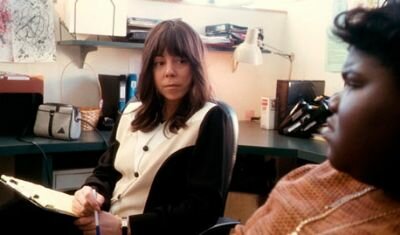|
| Tookey's Review |
|
| Pro Reviews |
|
| Mixed Reviews |
|
| Anti Reviews |
|
| Trailer |
|
| Cast |
|
| |
 |
| |
| Released: |
2009 |
| |
|
| Genre: |
DRAMA
OVERRATED
|
| |
|
| Origin: |
US |
| |
|
| Colour: |
C |
| |
|
| Length: |
109 |
|
| |
|
| |
|
|
| |
|
|
Deliberately ugly, less deliberately overwrought melodrama.
|
Reviewed by Chris Tookey
|
As the grimmest, most cheerless depiction ever of how it feels to be young, black and brutally oppressed, Precious is about as far from The Princess and The Frog as it is possible to get.
Clareece “Precious” Jones (played by 26 year-old newcomer Gabourey Sidibe, pictured right) is a huge, morbidly obese, scowling 16 year-old girl living in 1987 Harlem – if you can call it living. When she isn’t being raped by her sweaty, sexist father, she is being abused verbally and physically by her cruel, foul-mouthed mother. She is so far behind at school that she can’t read the word “at”, let alone “school”.
One bright spot in her life is her literacy class, where she is taught with saintly patience by her lesbian teacher improbably called Blu Rain (Paula Patton). Precious has trashy, politically incorrect fantasies, in which light-skinned men fancy her, she is adored by fans, and she is a thin, white blonde.
As if all this were not dispiriting enough, she has given birth to one incestuously conceived Down’s-syndrome child (whom she calls, with characteristic lack of sensitivity, Mongo), and is about to give birth to a second son-brother. Even more depressing news is yet to come.
By this point, you may be wondering how all this can possibly be entertaining. And you’re right: it isn’t. There’s not so much a story as a series of sadistic episodes, a heaping of misery upon misery. The novels of Thomas Hardy were light entertainment by comparison.
Director Lee Daniels is not a man who believes in subtlety. The rape sequences are enacted in brutal close-up intercut, in case these images are insufficiently disgusting, with shots of fried eggs sizzling in grease and pigs’ feet boiling on the stove. This guy can’t see a pudding without first overegging it and then zooming in on it.
The leading lady’s fantasies are similarly over-the-top. At one point she imagines herself as a character in an Italian neo-realist film that her mother has been watching on television, but you don’t believe in this for an instant. This mother would never watch such a picture. She watches it because Lee Daniels is gay, and Sophia Loren is a gay icon. The whole sequence is phoney and ill-conceived.
The film is, however, extremely well acted. Comedienne Mo-Nique turns in a powerful performance as the monstrously egotistical, lazy, manipulative, welfare-dependent mother and may well win the Best Supporting Actress Oscar, though I found the role too crude and one-dimensional to warrant it.
Pop diva Mariah Carey, minus her make-up (pictured left), is surprisingly affecting as a social worker who can’t always believe what she is hearing from her clients.
Only Paula Patton’s lipstick lesbian is a little too good to be true.
Director Lee Daniels has admitted to having a gay agenda, and it is far too obvious. Not content with a pair of saintly lesbians, he can’t resist beating us over the head with heterosexual female squalor and humiliation. Even that notorious misogynist Lars von Trier might think twice about putting his actresses through this.
I found myself especially uneasy about the way, in its final scenes especially, the movie pins virtually all the blame for the father’s sins on to the mother.
There is also, if you’ll pardon the metaphor, an elephant in the room. This girl is fat - grotesquely and self-harmingly fat. Yet the film is too politically correct for anyone to point her in a less lethal dietary direction. It’s as though extreme obesity is part of her cultural identity - a point Peter Bradshaw also made in his less than glowing review in the Guardian.
I can see why this film won the Grand Jury and Audience awards at the Sundance Film Festival. I too found myself moved by Precious’ s stoicism.
And yet… In the end, the movie doesn’t have anything much to say about her situation except “Look at her!” There is a thin line between compassion and voyeurism, soul-searing drama and overwrought melodrama, opera and Oprah. This film tramples all over it.
|
|
|
